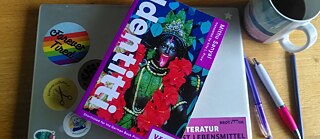September 2022
Mithu Sanyal: Identitti

Mithu Sanyal’s debut novel offers playful parallels with The Prime of Miss Jean Brodie.
In my early teens, I was mildly obsessed with The Prime of Miss Jean Brodie, Muriel Spark’s novel about a charismatic yet oh so problematic schoolteacher and the set of girls she attempts to shape. Two decades on, I still love Spark’s wit, her delight in people’s absurdity, and the way she constantly undercuts what the readers think they know.
Miss Jean Brodie and her prime make a couple of cameos in Mithu Sanyal’s debut novel Identitti, which is just out in the UK in a fantastic translation by Alta L. Price. On first glance, the books seem worlds apart: Spark’s novel has, deceptively, come to be a short-hand for a genteel, past (white) Edinburgh, while the riotously funny Identitti has its feet planted firmly in the twenty-first century, and is peppered with tweets, blog posts and post-colonial theory. Dig deeper though, and the parallels are there, not just in Sanyal’s cutting sense of humour and the way she shifts the rug from under both characters’ and readers’ feet, but also in the complex dynamic between the charismatic post-colonial professor Saraswati and the students whose ideas she tries to form.
Told from the perspective of post-grad student and blogger Nivedita, the novel starts when Saraswati – who on the first day of classes had kicked all the white students out of her seminar – is outed; the public intellectual who passes herself off as Indian is actually, it turns out, white. Confronted with the fact that her role model isn’t who she seems, Nivedita finds her own sense of belonging called into question too. With an Indian dad and a Polish/German mum, and labelled a ‘coconut’ as a child, Nivedita had never felt able to lay claim to her own identity until Saraswati gave her the language to express it. Suddenly this foundation seems shaky once again. Meanwhile, the public outcry and compulsory twitter shitstorm is just getting going. We follow the scandal on social media alongside Nivedita, with Sanyal drawing on a vast array of different voices and perspectives.
This could have made for a painful read – and yet it doesn’t. Without ever diminishing the weight of what Saraswati has done, Sanyal’s wit, Nivedita’s empathy and – yes – Saraswati’s charisma make for a book which is compassionate, enlightening and laugh-out-loud funny. On top of that, Identitti’s response to a landscape of debate where if you’re not in the right then you’re absolutely in the wrong is somehow profoundly comforting. Nivedita realises early on that her fellow students – hurt and angered by Saraswati’s betrayal – are in the right, but that their increasingly personal attacks are anything but. Quoting James Baldwin (and yes, this is a book that will leave you with a fully fledged reading list), Nivedita tries to figure out how we can disagree and yet still love each other.
There’s so much more I would I love to talk about: Nivedita’s conversations with the Hindu goddess Kali, her irreverent blog posts, and – let’s face it – the smouldering sexual tension between Nivedita and Saraswati. (That wasn’t just me, right?) But above all, I need to squeal a bit about Price’s remarkable translation. For me, the best translations are those that take risks and get creative, and Price does just that, capturing the humour and polyphony of the original. One particular highlight was her translation of Nivedita’s “Move over, Venus!” as “Scooch your cooch over, Venus!”, which had me cackling in delight. In her translator’s note Price mentions our tendency “to lament what is purportedly lost in translation without acknowledging what is undeniably gained.” So much is gained in and through this translation. So what are you waiting for? Read it!
About the author
Annie Rutherford makes things with words and champions translated literature in all its guises. A writer, translator and events organiser, she's currently researching the possibility of setting up a Writers in Exile residency in Edinburgh, and also runs Lighthouse Bookshop's Women in Translation book group. She can spot a misplaced apostrophe at a distance of fifty yards.Reserve the English translation Identitti in our Glasgow library.
Reserve the English translation Identitti in our London library.
E-Library: Borrow the original German title Identitti digitally.
Find out more about the blog.
Book Blog Overview